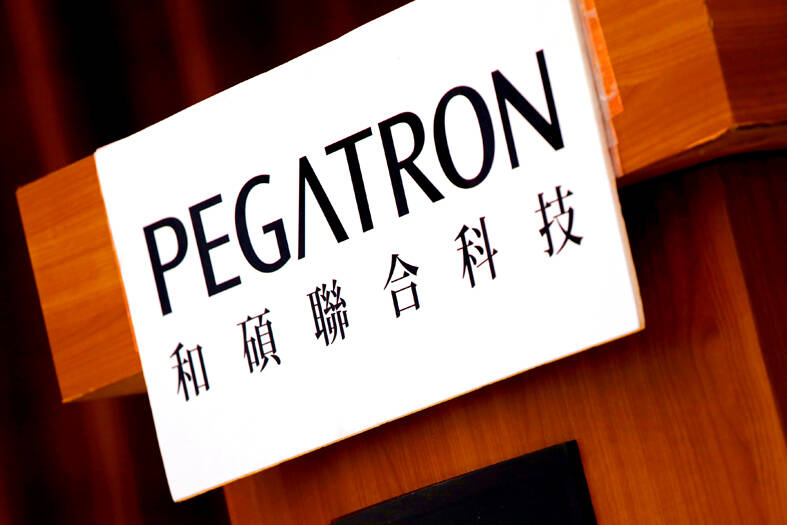Pegatron Corp (和碩), one of Apple Inc’s iPhone assemblers, yesterday said it is forfeiting control of a once fully owned subsidiary to Chinese rival Luxshare Precision Industry Co (立訊精密) in its latest effort to diversify its manufacturing sites geographically.
Its indirect share of Pegaglobe (Kunshan) Co Ltd (世碩電子) would drop to about 37.5 percent following the Chinese subsidiary’s latest share offerings, Pegatron said in a filing with the Taiwan Stock Exchange.
Luxsan Precision iTech (Kunshan) Co Ltd (立臻精密), a subsidiary of Luxshare, would subscribe to all of the new shares issued by Pegaglobe, which are worth 2.11 billion yuan (US$298.86 million), the filing said.

Pegaglobe has increased its registered shares to optimize its business as it braces for a rapidly changing industry environment and market conditions by forming a strategic partnership with Luxsan, Pegatron said in an e-mailed note.
The partnership would help Pegatron better utilize its resources and balance its global deployment, it said.
As Pagaglobe’s business model would remain intact, the deal would have limited impact on its operations, Pegatron said.
The firm said that it is diversifying its capacity geographically to provide as many options as possible for customers.
China remains its major manufacturing hub, with non-China capacity accounting for 15 percent, it said.
For Luxsan Precision iTech, the deal matches its strategy of boosting its smartphone assembling capacity to seek a bigger share of Apple Inc orders.
The Kunshan-based company in 2020 acquired two Wistron Corp (緯創) factories in China’s Jiangsu Province.
Wistron, which used to compete with Pegatron and Hon Hai Precision Industry Co (鴻海精密) for iPhone manufacturing orders, has disposed of its Chinese and Indian iPhone manufacturing capacity to focus on better-margin products such as artificial intelligence servers.
While Pegatron’s Chinese presence is shrinking, the company is expanding its manufacturing footprint in Vietnam.
In a separate filing yesterday, Pegatron said it plans to spend about NT$1.19 billion (US$38.74 million) to build new manufacturing facilities in Vietnam through its Pegatron Vietnam Co Ltd subsidiary.
Additionally, the firm would spend about NT$825 million to build employee dormitories in Vietnam, a separate filing said.
In Vietnam, Pegatron primarily makes consumer electronics such as smart speakers for Google, Surface laptops for Microsoft Corp and gaming consoles.
In Mexico, Pegatron makes electronic control units for vehicles, charging piles and components used in charging devices for a North American-based customer reported to be Tesla Inc.
The company also operates factories in India, Indonesia and the Czech Republic, it said.
Pegatron plans to spend US$300 million to US$350 million on new equipment and facilities this year.

SETBACK: Apple’s India iPhone push has been disrupted after Foxconn recalled hundreds of Chinese engineers, amid Beijing’s attempts to curb tech transfers Apple Inc assembly partner Hon Hai Precision Industry Co (鴻海精密), also known internationally as Foxconn Technology Group (富士康科技集團), has recalled about 300 Chinese engineers from a factory in India, the latest setback for the iPhone maker’s push to rapidly expand in the country. The extraction of Chinese workers from the factory of Yuzhan Technology (India) Private Ltd, a Hon Hai component unit, in southern Tamil Nadu state, is the second such move in a few months. The company has started flying in Taiwanese engineers to replace staff leaving, people familiar with the matter said, asking not to be named, as the

The prices of gasoline and diesel at domestic fuel stations are to rise NT$0.1 and NT$0.4 per liter this week respectively, after international crude oil prices rose last week, CPC Corp, Taiwan (台灣中油) and Formosa Petrochemical Corp (台塑石化) announced yesterday. Effective today, gasoline prices at CPC and Formosa stations are to rise to NT$27.3, NT$28.8 and NT$30.8 per liter for 92, 95 and 98-octane unleaded gasoline respectively, the companies said in separate statements. The price of premium diesel is to rise to NT$26.2 per liter at CPC stations and NT$26 at Formosa pumps, they said. The announcements came after international crude oil prices

A German company is putting used electric vehicle batteries to new use by stacking them into fridge-size units that homes and businesses can use to store their excess solar and wind energy. This week, the company Voltfang — which means “catching volts” — opened its first industrial site in Aachen, Germany, near the Belgian and Dutch borders. With about 100 staff, Voltfang says it is the biggest facility of its kind in Europe in the budding sector of refurbishing lithium-ion batteries. Its CEO David Oudsandji hopes it would help Europe’s biggest economy ween itself off fossil fuels and increasingly rely on climate-friendly renewables. While

SinoPac Financial Holdings Co (永豐金控) is weighing whether to add a life insurance business to its portfolio, but would tread cautiously after completing three acquisitions in quick succession, president Stanley Chu (朱士廷) said yesterday. “We are carefully considering whether life insurance should play a role in SinoPac’s business map,” Chu told reporters ahead of an earnings conference. “Our priority is to ensure the success of the deals we have already made, even though we are tracking some possible targets.” Local media have reported that Mercuries Life Insurance Co (三商美邦人壽), which is seeking buyers amid financial strains, has invited three financial